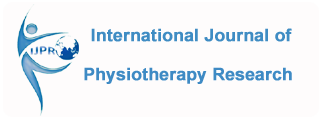IJPR.2020.188
Type of Article: Original Research
Volume 9; Issue 2 (April 2021)
Page No.: 3774-3779
DOI: https://dx.doi.org/10.16965/ijpr.2020.188
Effect of Pilates exercise on the level of fatigue, cognition and knee proprioception in the elderly population of 60-80 years
Shradha Santosh Shah *1, Sandhya Wasnik 2.
*1 MPT, Neurophysiotherapy, All India Institute of Physical Medicine and Rehabilitation, Mumbai, Maharashtra 400034, India.
2 Professor, All India Institute of Physical Medicine and Rehabilitation, Mumbai, Maharashtra 400034, India.
Address for correspondence: Dr. Shradha Santosh Shah, PT., MPT, Neurophysiotherapy, All India Institute of Physical Medicine and Rehabilitation, Mumbai, Maharashtra 400034, India. E-Mail: shradhashah76@gmail.com
ABSTRACT
Aim: To evaluate the effect of Pilates exercise on the level of fatigue, cognition and knee proprioception in elderly population (60-80 years).
Study design: experimental study; randomized control trial.
Method: 40 subjects both male and female of age ranging from 60-80 years (66.578 ± 4.857 in group A and 69.4 ± 5.442 in group B) were assigned in to two groups. The objective of the study was explained, and the subjects were screened based on the inclusion and exclusion criteria. Pre-interventional and post-interventional data analysis was done for FSS, 6MWT, MoCA and KJPS error angle. Group A (Experimental group) received Pilates exercise. Group B (control group) received aerobic and strengthening exercises. Both the groups underwent exercises 3 times a week on alternate days for 6 weeks. Duration of exercise for both groups was 45-60 minutes.
Results: Both the groups showed clinically and statistically significant improvement in FSS (p<0.0001 in both groups) 6MWT (p<0.0001 in both groups), MoCA (p<0.001 in both groups) and KJPS scores (p<0.0002 in group A and p<0.0001 in group B) at the end of 6 weeks of treatment. There was no significant difference between the groups for FSS (p=0.7226), 6MWT (p=0.813), MoCA (p=0.416) and KJPS (p=0.6213).
Conclusion: A significant improvement were observed in both the groups; which concluded that both the groups are equally effective in improvement of FSS, 6MWT, MoCA and KJPS scores.
Key words: Pilates exercise, elderly population, fatigue, cognition, knee proprioception.
REFERENCES
[1]. Engers PB, Rombaldi AJ, Portella EG, da Silva MC. The effects of the Pilates method in the elderly: a systematic review. Rev Bras Reumatol. 2016 Aug;56(4):352–65.
[2]. Shortz AE, Pickens A, Zheng Q, Mehta RK. The effect of cognitive fatigue on prefrontal cortex correlates of neuromuscular fatigue in older women. J NeuroEngineering Rehabil. 2015 Dec 21;12:115.
[3]. Grobe S, Kakar RS, Smith ML, Mehta R, Baghurst T, Boolani A. Impact of cognitive fatigue on gait and sway among older adults: A literature review. Prev Med Rep. 2017 Feb 24;6:88–93.
[4]. Ribeiro F, Oliveira J. Aging effects on joint proprioception: the role of physical activity in proprioception preservation. Eur Rev Aging Phys Act. 2007 Oct 1;4(2):71–6.
[5]. O’Sullivan SB.Physical Rehabilitation 6th edition.F.A. Davis Company.2014.
[6]. Menezes A.The complete guide to Joseph H Pilates’ Techniques of Physical Conditioning with special help for back pain & sports training. 2nd ed. Hunter House Publishers.2004.
[7]. Hassanpour-Dehkordi A, Jalali A. Effect of Progressive Muscle Relaxation on the Fatigue and Quality of Life Among Iranian Aging Persons. Acta Med Iran. 2016 Jul;54(7):430–6.
[8]. McGregor KM, Nocera JR, Sudhyadhom A, Patten C, Manini TM, Kleim JA, et al. Effects of aerobic fitness on aging-related changes of interhemispheric inhibition and motor performance. Front Aging Neurosci. 2013;5:66.
[9]. Guccione A. Geriatric Physical Therapy – 3rd Edition [Internet]. [cited 2019 Jun 28]. Available from: 978-0-323-02948-3.
[10]. Kaur R. comparision of pilates exercise and proprioceptive exercises on joint position sense in people with knee osteoarthritis. International Journal of Yoga, Physiotherapy and Physical Education. 2018 Jan;3(1):101-5.
[11]. Potteiger J.A. ACSM’s Introduction to Exercise Science. 3rd edition. Wolters Kluwer Health, 2017.
[12]. Memmedova K. Impact of Pilates on Anxiety Attention, Motivation, Cognitive function and Achievement of Students: Structural Modeling. Procedia – Soc Behav Sci. 2015 May 13;186:544–8.
[13]. Simoneau M, Bégin F, Teasdale N. The effects of moderate fatigue on dynamic balance control and attentional demands. J NeuroEngineering Rehabil. 2006 Sep 28;3:22.
[14]. Soysal Tomruk M, Uz MZ, Kara B, İdiman E. Effects of Pilates exercises on sensory interaction, postural control and fatigue in patients with multiple sclerosis. Mult Scler Relat Disord. 2016 May;7:70–3.
[15]. Di Lorenzo CE. Pilates. Sports Health. 2011 Jul;3(4):352–61.
[16]. Kisner carolyn. Therapeutic Exercise : Foundations and Techniques, 6th Edition.F.A. Davis Company.2017.
[17]. Laitman BM, John GR. Understanding How Exercise Promotes Cognitive Integrity in the Aging Brain. PLoS Biol. 2015;13(11):e1002300.
[18]. Ribeiro F, Oliveira J. Effect of physical exercise and age on knee joint position sense. Arch Gerontol Geriatr. 2010 Aug;51(1):64–7.










 Users Today : 287
Users Today : 287 Users Yesterday : 187
Users Yesterday : 187 This Month : 5648
This Month : 5648 This Year : 28364
This Year : 28364 Total Users : 130137
Total Users : 130137 Views Today : 420
Views Today : 420 Total views : 469105
Total views : 469105 Who's Online : 56
Who's Online : 56